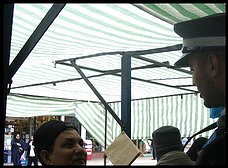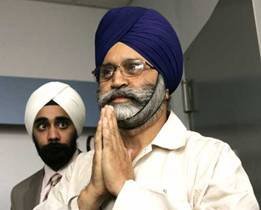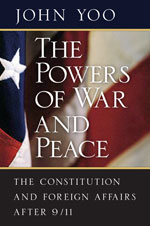Tuesday, January 31, 2006
Monday, January 30, 2006
Wisconsin Hate Crime Statute Not Unconstitutional
DNSI
 direct link
direct link

 Email post: Email post:

Friday, January 27, 2006
Thursday, January 26, 2006
"German school bans foreign languages"
United Press International is reporting that the The Herbert Hoover School in Berlin, Germany "has decided to ban foreign language classes in order to improve pupils German language skills." The article continues:Ninety percent of the school's students have foreign-born parents... and each class features between eight and ten different languages.
Since last September, however, 370 pupils have not been allowed to speak in their native tongue at school. The rule has entered the school's code of conduct, agreed to by parents' representatives and school authorities.
School headmaster Jutta Steinkamp told Deutsche Welle her pupils' command of German has improved substantially over the past few months.
"We have introduced this ban to enable our students to take part in German society through speaking and understanding the language properly," Steinkamp said, adding it was necessary to speak German well in order to get a job later in life. Relatedly, Syed Atiq ul Hassan offers this interesting essay regarding the assimiation of minority communities, with particular emphasis on Muslims in Australia. He argues: the minority cannot be assimilated according to the wishes of the majority. It is a natural and long-term process where minority people gradually adopt the habits, traditions and other social elements of majority on the basis of societal and communal needs and where the minority people find no harm their heritage, culture and faith. However, in this process of integration and assimilation, the minority always and systematically loose the derivations of culture and in some cases the faith.
DNSI
 direct link
direct link

 Email post: Email post:

Monday, January 23, 2006
Thursday, January 19, 2006
Court to Rule on Constitutionality of State Hate Crime Law
A Wisconsin Circuit Court Judge will rule next week on the constitutionality of the state's hate crime law, which enhances penalties for intentionally selecting the victim of a crime, "in whole or in part," on the basis of the victim's race, religion, color, disability, sexual orientation, national origin or ancestry. The ruling will settle a case involving two white firefighters charged with a hate crime against a black man.
The attorneys for the firefighters argued in part:[T]he state's current hate crime law "has never been addressed by an appellate court or the U.S. Supreme Court." [Also,] the law [is] overbroad.... [T]he law had a "chilling effect" on a person expressing their free speech. The law, as written, creates a "fear of being prosecuted...." [And,] under the current law, anyone who is in a bar fight in which insulting terms are being hurled back and forth could be charged with a hate crime. On the other hand, the District Attorney argued in part:[T]he U.S. Supreme Court has upheld Wisconsin's hate crime law [and that] the law is not about speech but about the actions of a person who selects a victim based on that person's race, sex or religion.
DNSI
 direct link
direct link

 Email post: Email post:

Tuesday, January 17, 2006
Commentary: Religious Exemptions to Generally Applicable Laws
In responding to a recent court ruling that "Wayne State University police should not have arrested a student for carrying knives that were part of his Sikh religious beliefs" [see previous post here], columnist Erik Gable argues that 1) "There's no real reason to prevent [the Sikh student] from wearing a kirpan [a ceremonial Sikh dagger]; doing so would be denying him the right to follow a tenet of his religion that harms nobody," 2) while "[t]he judge's intent clearly was to protect the Sikh student's freedom to practice his religion..., he also granted followers of Sikhism a privilege that members of no other religion can enjoy [a]nd that can be seen as its own form of religious discrimination," and 3) "The law should be applied equally to everyone, regardless of their religion [because] nobody is harmed by failure to obey a law...."
In short, Gable argues that religious exemptions are in effect forms of religious discrimination and, as an alternative to this unacceptable result, anyone should be permitted to disobey the law in question so long as "nobody is harmed by failure to obey" it.
Gable is thus advocating a legal system that adheres to the Harm Principle - that the only laws which should be enforced are those which prevent harm to others. This libertarian viewpoint extends beyond laws implicating religious beliefs and can negate many laws on the books, particularly those based on a moral code (i.e., harm to moral sensibilities, or mere offense).
To the extent that Gable contends that religious exemptions amount to religious discrimination, Sikhs are not given "preferential treatment." Members of other faiths who have a similar sincerely held belief can be granted the same exemption.
Moreover, Gable may want to read the Supreme Court's opinion in Jacobson v. Commonwealth of Mass., 197 U.S. 11 (1905). There, the Court noted that: [T]he liberty secured by the Constitution of the United States to every person within its jurisdiction does not import an absolute right in each person to be, at all times and in all circumstances, wholly freed from restraint. There are manifold restraints to which every person is necessarily subject for the common good. On any other basis organized society could not exist with safety to its members. Society based on the rule that each one is a law unto himself would soon be confronted with disorder and anarchy. Real liberty for all could not exist under the operation of a principle which recognizes the right of each individual person to use his own, whether in respect of his person or his property, regardless of the injury that may be done to others. Jacobson, 197 U.S. at 25. In other words, religious exemptions are permitted because they are based on sincerely held beliefs, not a capricious decision by an individual to disobey the law because he does not find it to be wise or because adherence would be inconvenient. For the state to sanction disobedience based on simple objection, rather than religious belief, would be for the state to invite all individuals to disobey the law whenever they please (perhaps unless the law in question prevents harm). Allowing religious exemptions to generally applicable laws thus strikes a balance between an individual's religious freedoms along with concern for the common good and general welfare.
DNSI
 direct link
direct link

 Email post: Email post:

Thursday, January 12, 2006
Judge Alito on the Government's Wartime Authority: Day Four
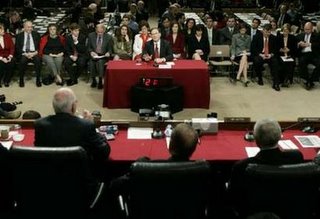
From the Senate Judiciary Committee's hearings on Judge Samuel Alito's nomination to the Supreme Court: BIDEN: Do you think the president has the authority to invade Iran tomorrow without getting permission from the people, from the United States Congress, absent him being able to show there's an immediate threat to our national security?
ALITO: Well, that's a question that I don't think is settled by -- the whole issue of the extent of the president's authority to authorize the use of military force without congressional approval has been the subject of a lot of debate.
The Constitution divides the powers relating to making war between the president and the Congress. It gives Congress the power to declare war, and obviously that means something. It gives Congress the power of the purse, and obviously military operations can't be carried out for any length of time without congressional appropriations. Congress is given the power to raise and support an Army, to maintain a Navy, to make the rules for governing the land and the naval forces.
The president has the power of the commander in chief. And I think there's been general agreement and the Prize cases support the authority of the president to take military action on his own in the case of an emergency when there is not time for Congress to react.
BIDEN: Is that the deciding question, if the Congress does not have the time to act?
ALITO: Well, the Prize cases I think are read to go as far as to say that in that limited circumstance the president can act without congressional approval.
A lot of scholars say that what's important as far as congressional approval is not the form, it's not whether it's a formal declaration of war or not, it's whether there is authorization in one form or another.
The war powers resolution was obviously an expression of the view on the part of Congress....
I've been trying to describe what I understand the authorities to say in this area. Generally, when this issue has come up, or variations of this issue have come up in relation to a number of recent wars -- there were a number of efforts to raise issues relating to this in relation to the war in Vietnam. There was an effort to raise it in relation to our military operations in the former Yugoslavia. In most of those instances they didn't -- in most of those instances were -- the cases were dismissed by the lower courts under the so-called political question doctrine that you described earlier....
BIDEN: So it's really kind of important, whether or not you think the president does not need the authority of the United States Congress to wage a war where there's not an imminent threat against the United States. And that's my question.
ALITO: And, Senator, if I'm confirmed and if this comes before me -- or perhaps it could come before me on the Court of Appeals -- the first issue would be the political question doctrine that I've described.
But if we were to get beyond that, what I can tell you is that I have not studied these authorities and it is not my practice to just express an opinion on a constitutional question.... including particularly one that is as momentous as this. I've set out my understanding of what the Constitution does in allocating powers relating to war between the executive and Congress, and some of what some of the leading authorities have said on this question. But beyond that -- and I haven't read Professor Yoo's book or anything that he's written on this issue -- I would have to study the question.
***
FEINSTEIN: What I'm saying is, that we set up a legal procedure by which you do it and we set two exigent circumstances to excuse a president from having to do it. Therefore, doesn't that law prevail?
ALITO: As I said, I think the threshold question is interpreting the scope of that and it might turn out to be an open-and-shut argument. It might turn out to be very complicated argument. I would not presume to voice an opinion on the question here, in particular because I have not studied it in the depth that I would have to study it before reaching a judicial decision on the matter.
Then, depending on how that issue was resolved, it would be -- it might be necessary to go on to the constitutional question. I think you exactly outlined where that would fall under Justice Jackson's method of analyzing these questions. This would be in the category in which, if it was determined that there was not statutory authorization...
FEINSTEIN: There was. No statutory authorization to wiretap, right?
ALITO: If it was determined that there was statutory authorization, then I do not know what the constitutional issue would...
FEINSTEIN: But, if there wasn't...
ALITO: There might be a constitutional issue. Let me stop there.
There would be a Fourth Amendment issue, obviously.
If you went beyond -- if you determined that there was not statutory authorization, then as far as the issue of presidential power is concerned, you would be in Justice Jackson's scheme, in the category where the president -- you would have to determine if this is the argument that is made; whether the president's power, inherent powers, the powers given to the president under Article II, are sufficient, even taking away congressional authorization, the area where the president is asserting a power to do something in the face of an explicit congressional determination to the contrary.
FEINSTEIN: Now, in my lay mind, the way I interpret that -- and correct me if I'm wrong -- is that you essentially have a conflict, and that it hasn't been decided whether one trumps the other.
ALITO: I think that's close to the point that I was trying to make. The way Justice Jackson described it was that you have whatever executive power the president has minus what Congress has taken away by enacting the statute.
FEINSTEIN: Even though you have a statutory prohibition, even a criminal prohibition?
ALITO: Well, I'm not suggesting how the determination would come out. I think that it is implicit in the way Justice Jackson outlined this that presidential -- he said it expressly -- presidential power is at its lowest in this situation, where the president is claiming the authority to do something that Congress has prohibited.
DNSI
 direct link
direct link

 Email post: Email post:

Judge Alito on the Government's Wartime Authority: Day Three

From the Senate Judiciary Committee's hearings on Judge Samuel Alito's nomination to the Supreme Court: LEAHY: [Justice Thomas] argued the government's power could not be balanced away by the court and there is no occasion to balance the competing interests.
Which one is right, Justice O'Connor or Justice Thomas? They're quite a bit different.
ALITO: Justice O'Connor wrote the opinion of the court.
The first question that she addressed in Hamdi was whether it was lawful to detain Hamdi, and it was a statutory question, and it was a question whether it was -- whether he was being detained in violation of what is often referred to as the anti-detention statute, which was passed to prevent a repetition of the Japanese internment that occurred during World War II. And she concluded that the authorization for the use of military force constituted an authorization for detention.
And then she went on to the issue of the constitutional procedures that would have to be followed before someone could be detained. And she looked to standard procedural due process law in this area and identified some of the requirements that would have to be followed before someone could be detained.
And now issues have arisen about the identity of the tribunal that is to make a determination about detaining people who are taken into custody during the war on terrorism.
And that's one of the issues that's working its way through the court system.
***
LEAHY: Which decision do you personally agree with, hers or the dissent by Justice Thomas?
ALITO: I think that the war powers are divided between the executive branch and the Congress. I think that's a starting point to look at in this area.
The president is the commander in chief, and he has authority in the area of foreign affairs and is recognized in Supreme Court decisions as the sole organ in the country for conducting foreign affairs....
I certainly don't think that the president has a blank check in time of war. He does have the responsibility as the commander in chief, which is an awesome responsibility.
***
DURBIN: So when Hamdi draws that line and Justice O'Connor makes that statement about no blank check for a president in times of war when it comes to rights of American citizens and there's an dissent from Justice Thomas who argues unitary executive, scope of powers, more power to the president, you are coming down on the majority side and not on the Thomas side of that argument.
DURBIN: Is that fair to say?
ALITO: Well, I'm not coming down -- I don't recall that Justice Thomas uses the term of unitary executive in his dissent. It doesn't stick out in my mind that he did. If he did, he's using it there in a sense that's different from the sense in which I was using the term.
DNSI
 direct link
direct link

 Email post: Email post:

Wednesday, January 11, 2006
Judge Alito on the Government's Wartime Authority: Day Two
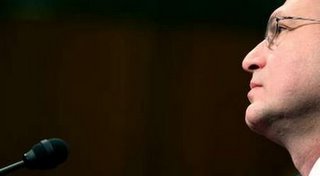 From the Senate Judiciary Committee's hearings on Judge Samuel Alito's nomination to the Supreme Court: From the Senate Judiciary Committee's hearings on Judge Samuel Alito's nomination to the Supreme Court:
SPECTER: Do you agree with Justice O'Connor's statement quoted frequently yesterday from Hamdi that, quote, "We have long since made clear that a state of war is not a blank check for the president when it comes to the rights of the nation's citizens," when she was citing the Youngstown case? Do you agree with that?
ALITO: Absolutely. That's a very important principle. Our Constitution applies in times of peace and in times of war, and it protects the rights of Americans under all circumstances.
SPECTER: You made a speech at Pepperdine where you said, in commenting about the decision of the Supreme Court in Ex parte Milligan, that, quote, "the Constitution applies even in an extreme emergency." The government made a, quote, "broad and unwise argument that the Bill of Rights simply don't apply during wartime." Do you stand by that statement?
ALITO: I certainly do, Senator.
The Bill of Rights applies at all times. And it's particularly important that we adhere to the Bill of Rights in times of war and in times of national crisis, because that's when there's the greatest temptation to depart from them.
***
ALITO: The Youngstown Steel case [] is certainly an example where President Truman thought that it was necessary to seize the steel mills so as not to interfere with the war effort in Korea, but the Supreme Court said that this was an overstepping of the bounds of executive authority.
There was a reference to United States v. Nixon, where the Supreme Court said that the president of the United States had to comply with a subpoena, with a grand jury subpoena, for documents. And they stood up for what they understood the law to mean, despite the fact that there must have been great pressure against them in another direction.
So when situations like that come up, it is the responsibility of the judiciary to hold fast.
***
FEINGOLD: How does a court decide whether to rely on the facts presented to it by the executive in a national security case?
ALITO: What I was doing in that talk at Pepperdine was framing that question. And it's a lot easier to frame the question and to ask students to think about it and give me their reactions than it is to answer it.
We've had examples of instance in which the judiciary in the past has had to confront this issue of reviewing factual presentations of the executive in times of national crisis. And there have been instances in which the judiciary has accepted -- and I'm thinking of the Japanese internment cases -- has accepted, which were one of the great constitutional tragedies that our country has experienced -- has accepted factual presentations by the political -- by the executive branch that turned out not to be true and from my reading of what went on were not believed to be true by some high-ranking executive officials at the time.
But there is the problem of judicial fact-finding, which I was talking about earlier, and the context of things that may be taking place on the battlefield, for example, or things that are taking place in wartime probably are more difficult for the judiciary to evaluate than other factual questions.
FEINGOLD: I do appreciate your reference in the Koramatsu to a case and the problem there and how this is going to become an even more serious issue.
***
GRAHAM: Who is better able to determine if an enemy combatant properly held has ongoing intelligence value to our country? Is it the military or a judge?
ALITO: On intelligence matters I would think that is an issue -- that is an area where the judiciary doesn't have expertise. But we do get into this issue I was discussing with Senator Feingold about the degree to which the balance between the judiciary's performing its function in cases involving individual rights and its desire not to intrude into areas where it lacks expertise, particularly in times of war and national crisis.
***
ALITO: The courts do not have expertise in foreign affairs or in military affairs. And they certainly should recognize that. And that is one powerful consideration in addressing legal issues that may come up in this context.
But there is the other powerful consideration that it is the responsibility of the courts to protect individual rights in cases that are properly before the court, cases where they have jurisdiction in one way or another, cases that are fit for judicial resolution.
DNSI
 direct link
direct link

 Email post: Email post:

Tuesday, January 10, 2006
Thursday, January 05, 2006
Tuesday, January 03, 2006
Muslim Chaplain Defends Actions, Describes Mistreatment
 James Yee, a third-generation Chinese-American and former Muslim chaplain for Camp Delta at Guantanamo Bay, has authored a new book, "For God and Country: Faith and Patriotism Under Fire," in which he describes his experiences in Gitmo and the manner in which he was treated by the government. James Yee, a third-generation Chinese-American and former Muslim chaplain for Camp Delta at Guantanamo Bay, has authored a new book, "For God and Country: Faith and Patriotism Under Fire," in which he describes his experiences in Gitmo and the manner in which he was treated by the government.
In particular, "federal agents accused him of spying because some personal papers — phone numbers, a to-do list, notes about Syria — were mistaken for classified documents." As a result, "He was taken to the Navy brig at Charleston, S.C., and held for 76 days in solitary confinement." The spying charges were dropped "for lack of evidence," however he was later charged with "adultery and having pornography on his computer." These charges, too, were dropped.
Yee writes"I came to understand just how craven the people behind this ordeal were. This was just another attempt to turn public attention away from the real questions that my case raised — civil liberties and what was happening inside Guantanamo — and steer it toward accusations that would sensationalize the hearing and in the process humiliate me."
DNSI
 direct link
direct link

 Email post: Email post:

|
|


